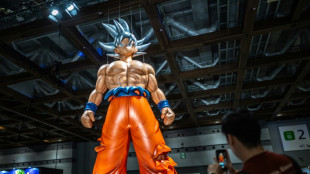
-
 Markets fluctuate as traders weigh geopolitical tensions
Markets fluctuate as traders weigh geopolitical tensions
-
N. Korea's latest weapon? Bombarding South with noise

-
 'Kidnapped' Uganda opposition figure Besigye to appear at military court: lawyer
'Kidnapped' Uganda opposition figure Besigye to appear at military court: lawyer
-
Asian markets fluctuate as traders weigh geopolitical tensions

-
 'An inauspicious day': the landmines ruining Myanmar lives
'An inauspicious day': the landmines ruining Myanmar lives
-
UN to vote again on Gaza ceasefire, US plans unclear

-
 Japan's manga powerhouse 'Dragon Ball' turns 40
Japan's manga powerhouse 'Dragon Ball' turns 40
-
Japanese, Koreans bottom of global love life survey

-
 Son blames 'mistakes' after South Korea held by Palestine in qualifier
Son blames 'mistakes' after South Korea held by Palestine in qualifier
-
Japan ramps up tech ambitions with $65 bn for AI, chips

-
 Lights, action, melodrama! Silent films get new reel at London haven
Lights, action, melodrama! Silent films get new reel at London haven
-
Myanmar led world in landmine victims in 2023: monitor

-
 ICC to sentence Timbuktu war criminal
ICC to sentence Timbuktu war criminal
-
Ugandan opposition figure Besigye 'kidnapped', says wife

-
 Australia's Jason Day eyes more major glory after resurgence
Australia's Jason Day eyes more major glory after resurgence
-
Machu Picchu security boosted after visitors spread human ashes

-
 Popovic hails Australia character in 'crazy' World Cup qualifier
Popovic hails Australia character in 'crazy' World Cup qualifier
-
Taliban govt clearing 'un-Islamic' books from Afghanistan shelves

-
 Argentina beat Peru as Uruguay hold Brazil
Argentina beat Peru as Uruguay hold Brazil
-
Asian markets struggle as traders weigh geopolitical tensions

-
 Tatum stars as Celtics end Cavaliers unbeaten start
Tatum stars as Celtics end Cavaliers unbeaten start
-
Hurting India under pressure in blockbuster five-Test Australia series

-
 'They killed her dream': Israel strike leaves woman footballer in coma
'They killed her dream': Israel strike leaves woman footballer in coma
-
Iraq holds its first census in nearly 40 years

-
 Iraqis face tough homecoming a decade after IS rampage
Iraqis face tough homecoming a decade after IS rampage
-
Russian net tightens around last civilians left in eastern Ukraine

-
 Olympic champion Tebogo aims to inspire next generation of African athletes
Olympic champion Tebogo aims to inspire next generation of African athletes
-
Valencia on target as ten-man Ecuador upset Colombia

-
 'Rust' to premiere three years after on-set shooting
'Rust' to premiere three years after on-set shooting
-
Strike at French cognac maker Hennessy over measures in China spat

-
 Xi, Lula meet in Brasilia to 'enhance ties'
Xi, Lula meet in Brasilia to 'enhance ties'
-
SpaceX fails to repeat Starship booster catch, as Trump watches on

-
 'I have left a legacy': Nadal retires from tennis
'I have left a legacy': Nadal retires from tennis
-
US recognizes Venezuela opposition's Gonzalez Urrutia as 'president-elect'

-
 European powers, US seek to censure Iran at UN nuclear watchdog board
European powers, US seek to censure Iran at UN nuclear watchdog board
-
UNAIDS chief says husband, Ugandan opposition figure Besigye, 'kidnapped'

-
 Nadal's sensational career ends as Netherlands defeat Spain in Davis Cup
Nadal's sensational career ends as Netherlands defeat Spain in Davis Cup
-
US announces talks with Israel over civilian casualties in Gaza

-
 SpaceX fails to repeat Starship booster catch, as Trump looks on
SpaceX fails to repeat Starship booster catch, as Trump looks on
-
G20 summit ends with Ukraine blame game

-
 Trump appoints TV celebrity 'Dr. Oz' to key US health post
Trump appoints TV celebrity 'Dr. Oz' to key US health post
-
European stocks fall on Ukraine-Russia fears, US focused on earnings

-
 Last-gasp Szoboszlai penalty rescues Hungary draw with Germany
Last-gasp Szoboszlai penalty rescues Hungary draw with Germany
-
Germany, Netherlands draw as Nations League group stage ends

-
 Hong Kong tycoon Jimmy Lai takes witness stand in collusion trial
Hong Kong tycoon Jimmy Lai takes witness stand in collusion trial
-
Guardiola set to extend stay as Man City boss - reports

-
 Minnows Botswana hold Egypt to qualify with Mozambique, Tanzania
Minnows Botswana hold Egypt to qualify with Mozambique, Tanzania
-
Inter Miami coach Martino leaving club for 'personal reasons' - club source

-
 Chinese man sentenced to 20 months for Falun Gong harassment in US
Chinese man sentenced to 20 months for Falun Gong harassment in US
-
Hong Kong court jails 45 democracy campaigners, drawing condemnation


EU lawmakers take first step towards AI curbs
European Parliament lawmakers on Thursday took a crucial first step towards EU-wide regulation of ChatGPT and other artificial intelligence systems that Brussels hopes to put speedily in place.
Parliamentary committees on civil liberties and consumer protection overwhelmingly voted for a position text calling for curbs on how AI can be used in Europe, while still fostering innovation in the sector.
The text is to be put to the full parliament next month for adoption before negotiations with EU member states on a final law.
Lawmakers called Thursday's vote "historic" and hoped it would lead to "the world's first rules on artificial intelligence".
Their text picks up the main lines from a European Commission proposal made two years ago, but suggests adding bans on biometric surveillance, emotion recognition and predictive policing AI systems.
It seeks to put generative AI systems such as ChatGPT and Midjourney in a category requiring special transparency measures, such as notifications to users that the output was made by a machine, not a human.
The parliament's text also seeks additional criteria as to what constitutes a "high-risk" AI area of application, which could reduce the scope of that designation.
The commission proposed list covers AI in critical infrastructure, education, human resources, public order and migration management.
But the MEPs want an additional threshold to be met, requiring that threats to safety, health or fundamental rights are also deemed to be in play.
- Companies see innovation threat -
The CCIA, a European industry lobby group representing major tech companies, said that, while "the parliament made some useful improvements to the text", it was "abandoning the risk-based structure" of the European Commission's proposal.
"The best way for the EU to inspire other jurisdictions is by ensuring that new regulation will enable, rather than inhibit, the development of useful AI applications," said CCIA policy manager for Europe, Boniface de Champris.
The European Consumer Organisation though endorsed the parliament injecting "beefed-up protections for consumers" in its text compared to the commission one.
"Although AI may improve our lives in many ways, there are well-founded concerns that AI systems can also harm consumers. People must be properly protected against the risks of these new technologies," said Ursula Pachl, deputy director of the organisation.
While EU work towards legislation has been going on for some time, the potential -- and potential perils -- of AI has exploded into the public consciousness only in the last few months, since ChatGPT burst onto the scene at the end of last year.
Image-generation AI such as Midjourney and DALL-E have since sparked an online rush to make lookalike Van Goghs or a pope in a high fashion puffer jacket, while AI music sites have impressed with their ability to produce human-like singing.
"It's enough to turn on the TV since the last two, three months, almost every day, to see how important this file is becoming for citizens," said one of the lead MEPs on the European Parliament text, Drago Tudorache.
Policymakers in Europe and other regions in the world are increasingly concerned how the technology can be used for fakery, to fool people and sway public opinion and elections.
That has spurred Elon Musk and some researchers to urge a moratorium until legal frameworks can catch up.
In the commission proposal, AI companies would be required to maintain human control over their algorithms, provide technical documentation and have a risk-management system for "high-risk" applications.
Each EU member state would have a supervising authority to make sure the rules are abided by.
MEPs also want AI companies to put in place protections against illegal content and on copyrighted works that might be used to train their algorithms.
They also want to prevent the scraping of photos posted on the internet for training algorithms unless the authorisation of the people concerned is obtained.
E.Rodriguez--AT

